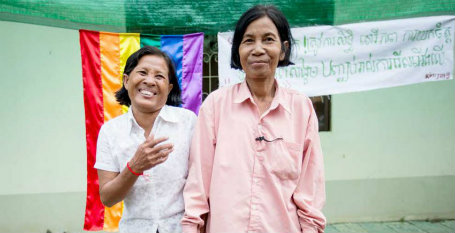Gay rights activists in Cambodia say that neighboring Vietnam’s decision to abolish its ban on same-sex couples marrying might influence Cambodian authorities to follow suite and improve its position on the local LGBT community.
Vietnam is a “leading country” in Southeast Asia and Cambodia will be affected by what its neighbor has done, Sidara Nuon from the Sexual Orientation and Gender Identity project at the Cambodian Center for Human Rights told The Phnom Penh Post.
Vietnam on New Year Day abolished a ban on same-sex marriage allowing for such weddings to take place without the threat of fines, censure or government harassment.
On the other hand gay marriage is illegal in Cambodia, with the constitution stating that it must be between “one husband and one wife.”
However, it is possible for Cambodia to be influenced by Vietnam and for Cambodian NGOs and activists will attempt to apply the Vietnamese changes within a “Cambodia context” said Nuon.
This is because Vietnam and Cambodia share a land border and common historical link as being part of the French colonial empire. Also, the communist victory in Vietnam in 1975 was accompanied by similar communist successes in Cambodia.
Since the 1990s, both countries have opened and developed cross-border trade with Vietnam being Cambodia's third-largest export market. Vietnam is already Cambodia's 10th largest foreign investor as the two countries enjoy very complementary economies and similar consumer demands and habits.
Many human rights activists believe that Vietnam, regarded as Southeast Asia’s most repressive state, has realized that the gay rights issue is scoring them points on the international stage and distracting from its crackdown on bloggers and dissidents and arrests over freedom of speech, expression and religion.
Gay rights just happens to be the beneficiary of the communist regime’s suppression of organized movements, they say.
Rainbow Community Kampuchea’s Collette O’Regan told The Phnom Penh Post that she thinks the development in Vietnam creates a precedent that Cambodian authorities may be inclined to follow so as to “bring kudos to the [government].”
Nonetheless, Phil Robertson, deputy director of Human Rights Watch’s Asia division, said Cambodia could learn from its eastern neighbor. “Cambodia should take a human rights cue from Vietnam – and move to recognize the right to same-sex marriage and non-discrimination towards LGBT persons in all aspects of law and regulation,” he told The Phnom Penh Post.
Non-commercial and private same-sex relations is legal between consenting adults in Cambodia but the Buddhist cultural tolerance of LGBT people has yet to advance LGBT-rights legislation. There is no law that expressly deals with discrimination, harassment or violence against LGBT people which still occurs due to an intense social pressure to marry and raise a family.
Gay rights activists in Cambodia say that neighboring Vietnam’s decision to abolish its ban on same-sex couples marrying might influence Cambodian authorities to follow suite and improve its position on the local LGBT community.
Vietnam is a “leading country” in Southeast Asia and Cambodia will be affected by what its neighbor has done, Sidara Nuon from the Sexual Orientation and Gender Identity project at the Cambodian Center for Human Rights told The Phnom Penh Post.
Vietnam on New Year Day abolished a ban on same-sex marriage allowing for such weddings to take place without the threat of fines, censure or government harassment.
On the other hand gay marriage is illegal in Cambodia, with the constitution stating that it must be between “one husband and one wife.”However, it is possible for Cambodia to be influenced by Vietnam and for Cambodian NGOs and activists will attempt to apply the Vietnamese changes within a “Cambodia context” said Nuon.
This is because Vietnam and Cambodia share a land border and common historical link as being part of the French colonial empire. Also, the communist victory in Vietnam in 1975 was accompanied by similar communist successes in Cambodia.
Since the 1990s, both countries have opened and developed cross-border trade with Vietnam being Cambodia's third-largest export market. Vietnam is already Cambodia's 10th largest foreign investor as the two countries enjoy very complementary economies and similar consumer demands and habits.
Many human rights activists believe that Vietnam, regarded as Southeast Asia’s most repressive state, has realized that the gay rights issue is scoring them points on the international stage and distracting from its crackdown on bloggers and dissidents and arrests over freedom of speech, expression and religion.Gay rights just happens to be the beneficiary of the communist regime’s suppression of organized movements, they say.
Rainbow Community Kampuchea’s Collette O’Regan told The Phnom Penh Post that she thinks the development in Vietnam creates a precedent that Cambodian authorities may be inclined to follow so as to “bring kudos to the [government].”
Nonetheless, Phil Robertson, deputy director of Human Rights Watch’s Asia division, said Cambodia could learn from its eastern neighbor. “Cambodia should take a human rights cue from Vietnam – and move to recognize the right to same-sex marriage and non-discrimination towards LGBT persons in all aspects of law and regulation,” he told The Phnom Penh Post.
Non-commercial and private same-sex relations is legal between consenting adults in Cambodia but the Buddhist cultural tolerance of LGBT people has yet to advance LGBT-rights legislation. There is no law that expressly deals with discrimination, harassment or violence against LGBT people which still occurs due to an intense social pressure to marry and raise a family.

